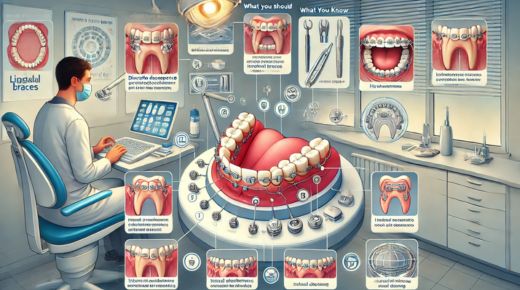What You Should Know About Lingual Braces
Lingual braces are a great option if you want a discreet way to straighten your teeth. Unlike traditional braces, these are placed on the back of your teeth. This means they are hidden from view. Many people choose them for this reason. Before making a decision, there are a few key things to understand. Not all dental professionals offer this option. Checking with your orthodontist richmond tx is a good first step. They can provide guidance based on your specific needs.
How Lingual Braces Work
Lingual braces use the same technology as traditional braces. Small brackets attach to each tooth. A wire connects them and applies pressure to move teeth into the desired position. Since they are on the backside of your teeth, they are less visible. This can be ideal for those who feel self-conscious about wearing braces.
Benefits of Lingual Braces
There are several benefits to choosing lingual braces:
- Discreet Appearance: Since they are hidden behind teeth, they are less noticeable.
- Custom Fit: Each bracket is custom-made for your teeth, offering a snug fit.
- Effective Treatment: Lingual braces can treat a wide range of dental issues.
Considerations and Challenges
While there are many benefits, there are also some challenges to keep in mind:
- Comfort Level: Some may find lingual braces less comfortable, especially at first.
- Speech Impact: They might affect speech more than traditional braces initially.
- Cost: They can be more expensive due to the custom design.
Comparison Table: Lingual vs. Traditional Braces
| Feature | Lingual Braces | Traditional Braces |
| Visibility | Hidden | Visible |
| Comfort | May cause tongue irritation | Easier to adjust to |
| Cost | Higher | Lower |
| Effectiveness | High | High |
Who Should Consider Lingual Braces?
Lingual braces are an excellent choice for those who prioritize a discreet orthodontic option. They are suitable for adults and teens who meet specific dental criteria. However, they may not be the best choice for individuals with very small teeth or severe bite issues. Consulting with a qualified orthodontist can determine if lingual braces are right for you. More information on orthodontic treatments can be found on the American Dental Association website.
Caring for Lingual Braces
Caring for lingual braces is crucial to ensure effectiveness and oral health:
- Regular Cleaning: Brush and floss carefully to avoid plaque buildup.
- Food Choices: Avoid hard or sticky foods that can damage braces.
- Routine Check-Ups: Attend regular orthodontic appointments for adjustments.
Final Thoughts
Choosing lingual braces can be a smart move for those needing a less visible option. While they come with some challenges, the benefits often outweigh the drawbacks. Discussing with an orthodontist will provide more personalized guidance. For additional resources on orthodontic care, visit the National Institutes of Health website. Making informed decisions about your oral health is important for achieving the best results.

